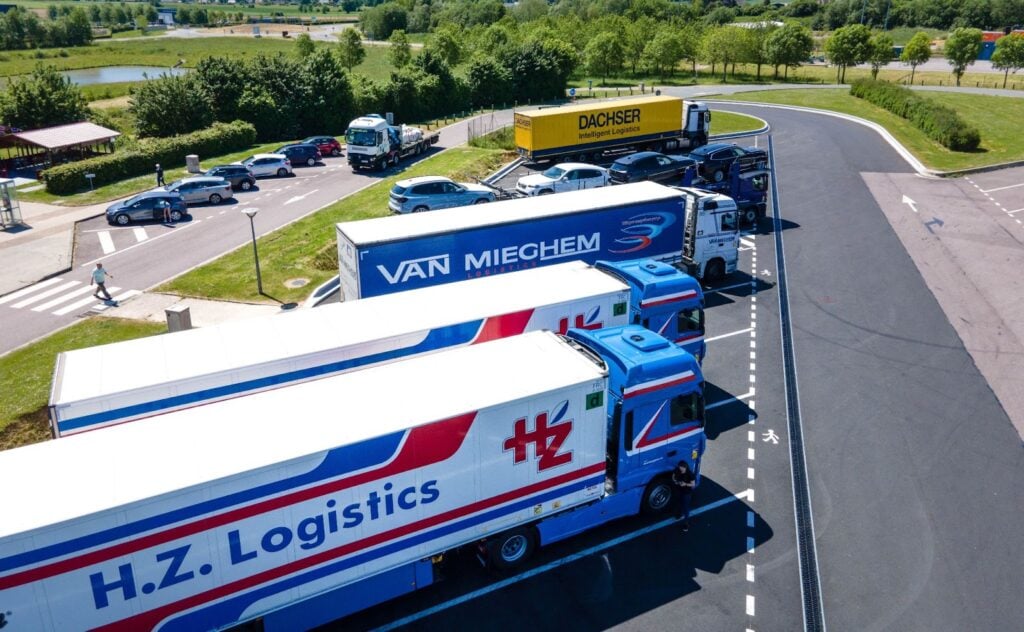In the intricate web of logistics, where goods move from point A to point B, numerous terms and concepts define the smooth functioning of the supply chain. One such fundamental component is the humble yet crucial ‘trailer.’ In this blog, we delve into the depths of logistics to understand what a trailer is, its types, and its significance in the logistics landscape.

What is a Trailer?
In the realm of transportation and logistics, a trailer is a vehicle without its own power source, designed to be towed by a powered vehicle. It serves as a container for transporting goods, offering a secure and enclosed space to safeguard the cargo during transit. Trailers come in various shapes and sizes, tailored to accommodate different types of cargo and suit diverse transportation needs.
Types of Trailers
- Dry Van Trailers: Also known as box trailers or dry vans, these are the most common type of trailers. They feature an enclosed box-like structure, providing protection from weather elements and theft. Dry van trailers are versatile and can transport a wide range of goods, from electronics to textiles.
- Flatbed Trailers: As the name suggests, flatbed trailers have a flat, open surface without any sides or roof. They are suitable for transporting oversized cargo, machinery, construction materials, and vehicles that can be driven onto the trailer.
- Refrigerated Trailers (Reefers): Refrigerated trailers are equipped with cooling units to maintain specific temperature conditions, making them ideal for transporting perishable goods such as food, pharmaceuticals, and chemicals that require temperature control throughout the journey.
- Tank Trailers: These trailers are cylindrical in shape and designed to transport liquids and gases, including petroleum, chemicals, and liquefied gases. They come in various configurations to accommodate different types of liquids and gases safely.
- Specialized Trailers: There are trailers designed for specialized purposes, such as car carriers for transporting automobiles, livestock trailers for transporting animals, and intermodal containers that can be transferred between different modes of transportation, such as ships, trains, and trucks.
Significance of Trailers in Logistics
Trailers play a vital role in the logistics chain by facilitating the movement of goods from manufacturers to distributors, retailers, and ultimately, consumers. Here’s why trailers are indispensable:
- Flexibility: With various types of trailers available, logistics companies can choose the most suitable trailer based on the type of cargo, transportation distance, and specific requirements, ensuring efficient and cost-effective transportation solutions.
- Protection: Trailers provide a secure and enclosed environment for goods, protecting them from damage, theft, and adverse weather conditions during transit, thereby maintaining the quality and integrity of the cargo.
- Efficiency: By using trailers, logistics operators can optimize load capacity, streamline transportation routes, and minimize handling times, resulting in improved efficiency and reduced operational costs.
- Versatility: Whether it’s transporting dry goods, perishable items, liquids, or oversized equipment, there’s a trailer designed to meet every transportation need, offering versatility and adaptability in the logistics process.
In conclusion, trailers are the unsung heroes of the logistics industry, silently carrying the weight of global trade and commerce on their sturdy frames. Understanding the different types of trailers and their significance in logistics is crucial for anyone involved in the movement of goods, from manufacturers and suppliers to transportation companies and end consumers. As logistics continues to evolve in response to changing consumer demands and technological advancements, trailers will remain a cornerstone of efficient and reliable transportation solutions.


